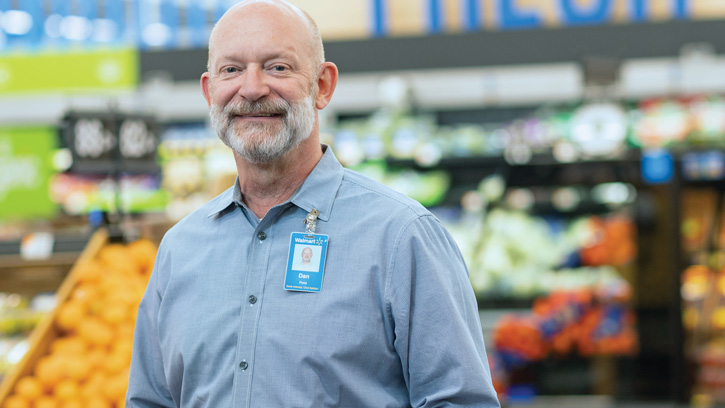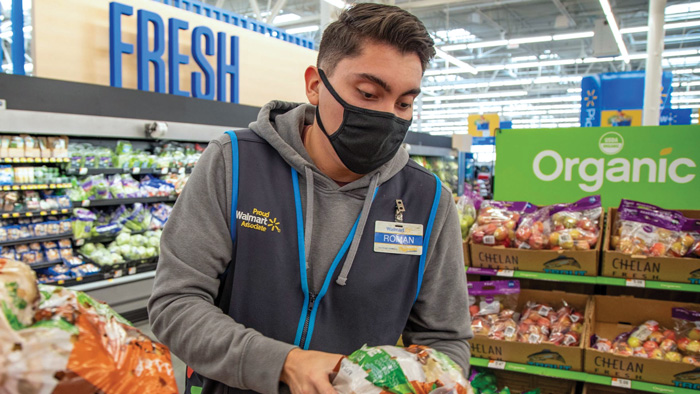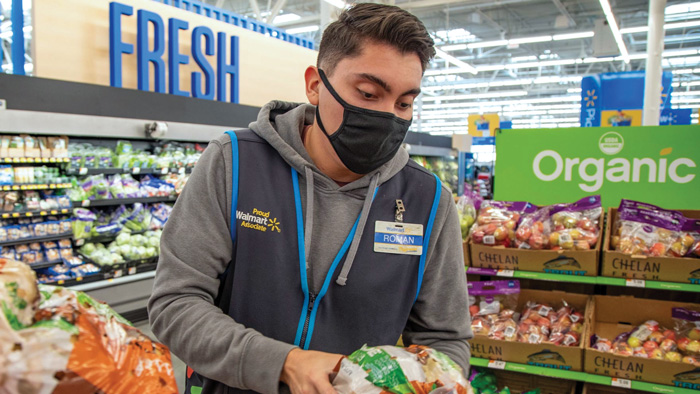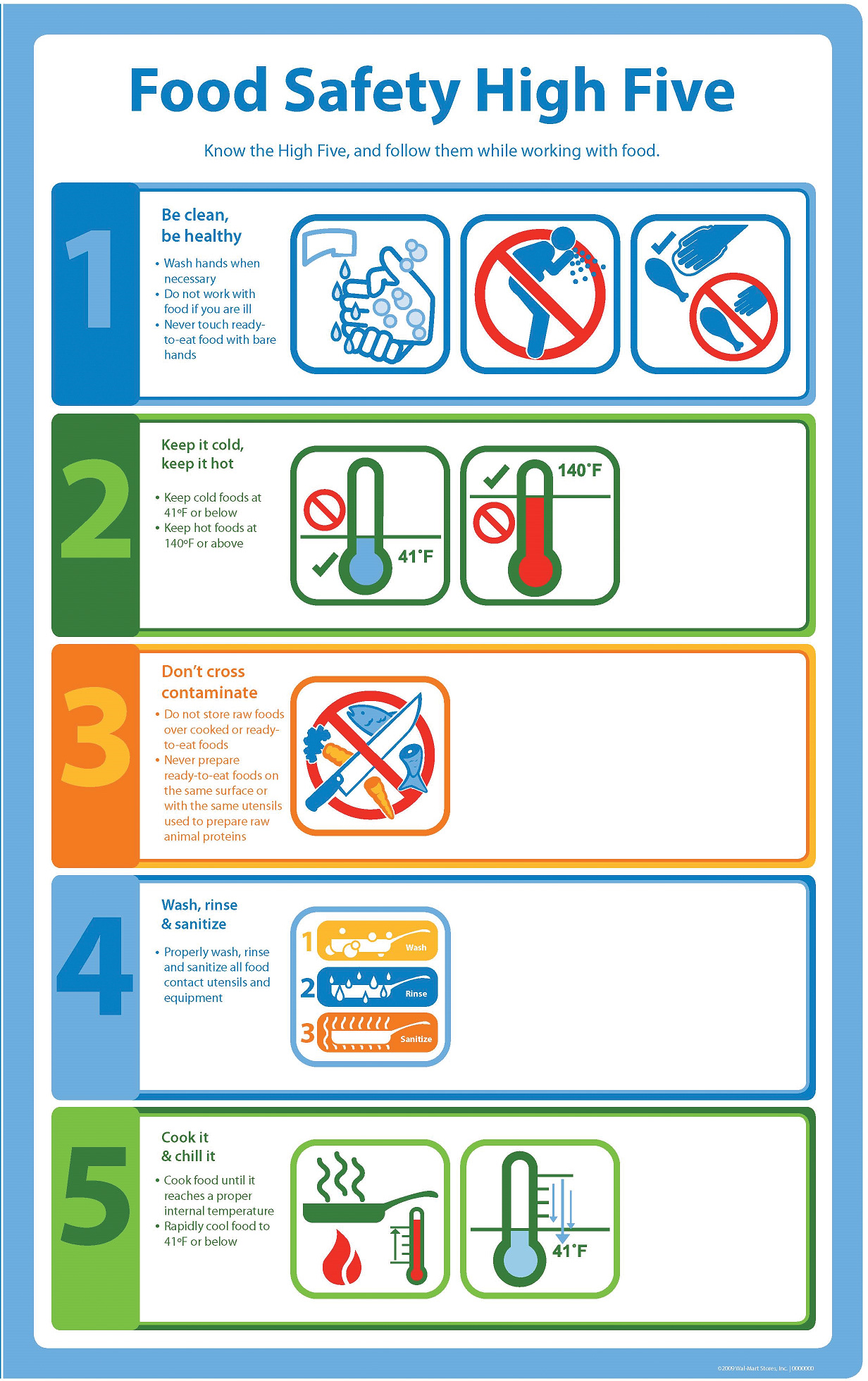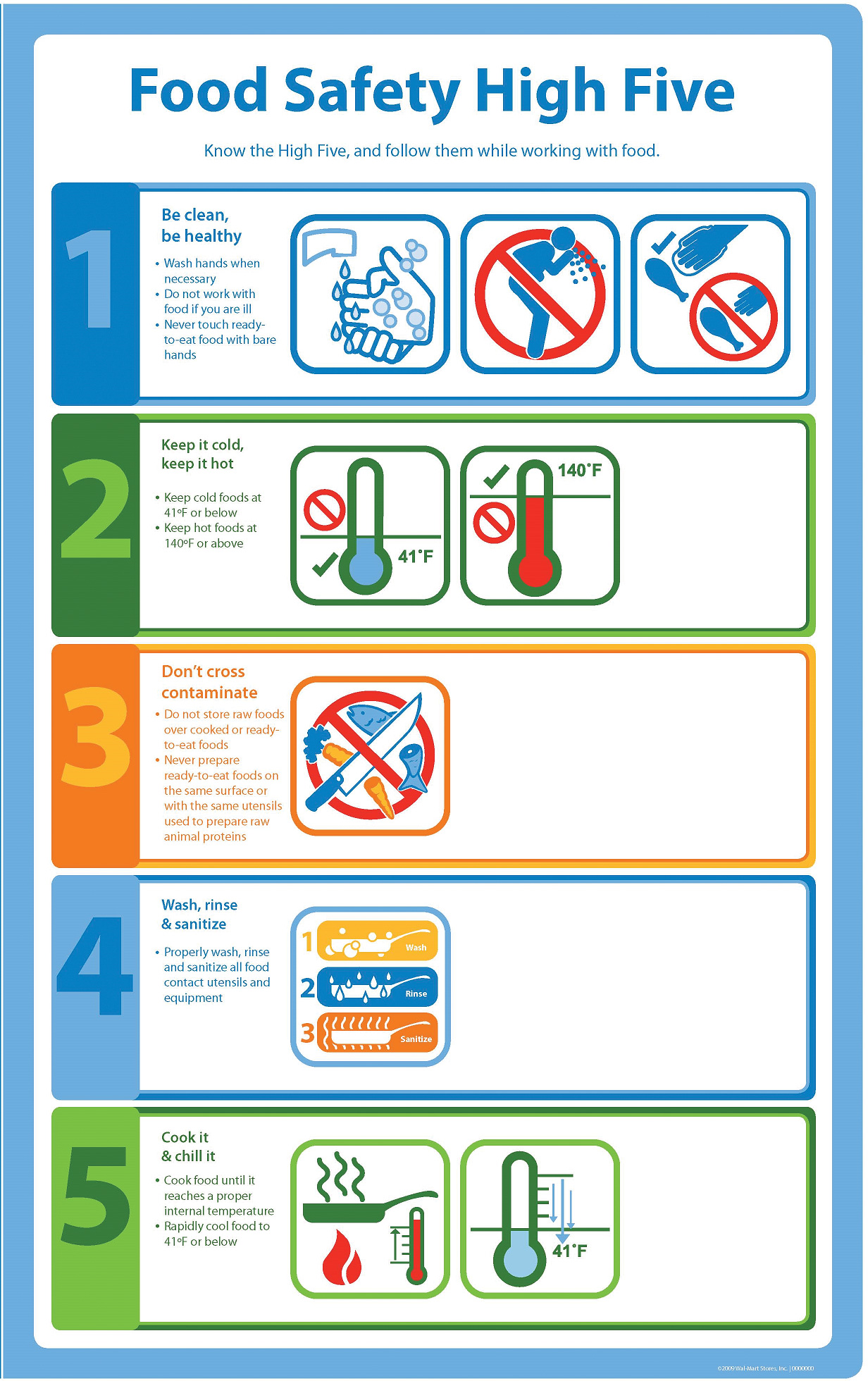
Setting the Food Safety Bar High at Walmart
Ensuring the safety of the retail behemoth’s products across the supply chain is a daily responsibility for Dan Fone. Here’s what he had to say about his approach to the job.
Article Content
As senior director of U.S. food safety for Walmart, Dan Fone makes no little plans. Supporting the corporate giant along the entire food safety continuum is all in a day’s work for this 30-year industry veteran.
Fone, who joined Walmart in 2017 as senior director for international food safety, has a diverse background as a regulator, a systems assessor, and a consultant or advisor with food safety and environmental compliance programs around the world. He began his career in environmental health in the United Kingdom and later spent more than nine years at NSF International, a U.S.-based product testing, inspection, and certification organization. Fone also has worked extensively in the field of behavior, specifically in understanding the role of behavioral attitude and influence in developing food safety cultures within organizations.
A passionate advocate of the role that effective training and education plays in food safety, Fone talked to Food Technology about the challenges and opportunities that come with leading Walmart’s U.S. food safety team. This interview was edited for clarity and brevity.
Q: What is a typical day on the job at Walmart like?
Fone: Walmart food safety never sits still. No two days are the same. We cover . . . everything from supplier, food safety, management, and approval through to movement of products and goods across our network storage distribution, into our stores and clubs, and then delivery to our customers and members—whether that be direct install or club, pickup points, and then through various delivery to customer and members’ properties.
Although most of our stores and clubs no longer operate 24/7, we are a 24/7 company. Things move quickly, and we need to be flexible to ensure that we are available to support our merchants, our operators, our store and club associates, and our teams around the world. So . . . we have operations in China, India, and South Africa, bringing three different time zones into our days, and we need to be flexible to support those global team members as well.
Q: How does Walmart’s enormous size impact the way you do your work?
Fone: One of the areas that we have to always think about is sheer size and complexity. I think that probably . . . part of our biggest challenge is, how you put in place a program that you can roll out to more than 2 million employees. How do you develop a program that you can implement in more than 10,000 facilities? And these are big, big numbers. So that’s always something in the front of our minds as a food safety group: How do we make something that’s able to be implemented [in a practical way] across large numbers?
Q: How have you seen COVID-19 impact food safety culture in the United States?
Fone: It’s obviously been an interesting topic of conversation over the last two years. And I think to me, the most important aspect has been the increased focus on handwashing and personal hygiene—absolutely key defenses in preventing foodborne illness. And I have to say any highlight on increased handwashing [and] hand sanitation has got to be a good thing.
Q: As a thought leader in food safety, what do you see as new areas of concern on the horizon?
Fone: I think we are trying to move the dial on effective training. What we really want to ensure is that our associates are confident in what we train them to do. To me, confidence in your training is incredibly important. It means that people will actually put that knowledge into practice. I think a focus on traceability systems is going to be a continuing area of importance [too]. And I think the third element for me would be ensuring that economically motivated adulteration of food or food fraud is better understood and has a light shown upon it.
Q: How does Walmart vet a new food product for safety?
Fone: It’s a long process, very involved, and something that we do in partnership with our merchants and our product developers. [It] involves seeking information from an existing or prospective supplier to ensure that we can see that they have safety controls in place for their product, for the process that produces that product, and for the facility that process operates within. That will then give us confidence in them as a safe provider.
We still rely heavily on the Global Food Safety Initiative [GFSI] certification program. And that’s an integral part of our evaluation process, but we go deeper than just GFSI. We look to understand individual products, individual facilities, and ensure that any prospective manufacturer producer for us knows what they’re doing and knows how to produce product safely.
Q: Walmart has been instrumental in raising the bar for food specifications and microbial testing. What new standards will suppliers see in the near future?
Fone: We are very proud of the initiatives that we’ve implemented over the course of the last 10 to 15 years, particularly in ground beef, in poultry safety, in leafy greens, berries. And we’ll continue to look for specific commodities where we feel that we need to exert more control and look for more information. We’ll continually look to improve our standards and controls and our systems.
I think you can safely say that we will continue to look to enhance everything that we do, whether that be across the supply chain in general or diving into specific commodities in the future. We continue to look for commodities that may have started to cause concern, work with our peers, and work with academia and industry to bring about new controls where we feel that they’re necessary.
Q: Do you have a food safety training program for new employees?
Fone: Yes, absolutely. And a real focus for us, what we learned and understood over the years, is that we need to make training simple for people so that they’re confident in that training, but that training can also be practical. The days where we can have people sitting for six to eight hours in a classroom, quite frankly, are gone. The new generations are not learning in that way anymore. They’re learning in sound bites, they’re learning from videos, they’re learning from YouTube.
We’ve tried to evolve our training program and platforms to ensure that we reflect those changes and that we make our training more accessible. Training that can be completed on handheld devices rather than finding a PC in a store. Programs that can be completed in short sessions, rather than having to sit for hours and perhaps losing attention. And that’s something we keep under constant review because we feel that training needs to be refreshed on a regular basis, so that people are having messaging reinforced as they learn. And training really is an ongoing process—we can never train too much.
Q: How do you measure the effectiveness of food safety training?
Fone: I think that the proof of the pudding is in the eating. Sometimes we would judge that by the standards that we see in our stores and clubs. We would [also] judge that by surveys that we undertake with our associates, whether that be through our Associate Engagement Survey [or] through surveys that we undertake with our third-party vendors who are in our stores and clubs every other month, or through our data analytics.
Looking at performance or key performance indicators in stores, we keep a close eye on chemical usage, on handwashing rates, on non-compliances across what we call our Food Safety High Five. We’re looking at implementation as a measure of effectiveness.
Q: What is Walmart’s Food Safety High Five?
Fone: Our Food Safety High Five is based around guidelines [from the U.S. Food and Drug Administration, the Centers for Disease Control and Prevention, and the World Health Organization] on key protective elements to reduce the amount of foodborne illness. We’ve broken that down into five simple processes. So it’s simple, easy to remember, and something that as a message can be regularly repeated in different ways. It gives associates something clear to base their knowledge around.
Q: Where does the role of behavioral attitude fit into influencing food safety cultures?
Fone: I’ve been heavily involved in the behavioral basis for food safety for probably the last 10 to 12 years, both in professional roles and as a personal interest. I’m privileged to lead the Walmart food safety culture center of excellence, where we have representatives from across all of our markets—from our chief ethics and compliance officer group, our continuous improvement group, our global sourcing group. We meet regularly to exchange best practices within the group. And we continue to try to drive a positive culture of food safety across the organization, whether that be through additional training and education, story sharing, or working with other third parties. That’s a continuing journey . . . so that will continue to be an important focus for us.
We try to share that [food safety] knowledge as widely as possible. As well as being part of the GFSI Technical Working Group on food safety culture and helping them produce their position paper, we’ve also been a sponsor of [BSI] Publicly Available Specification 320, PAS 320, which is in [development] at the moment. And we’ll act as a “how-to guide” for industries to understand how to implement and how to engender and drive a positive food safety culture across their operations. We are both financial sponsors and members of the steering group for that PAS 320 process.
Q: Does the United States have any unique aspects of its food safety culture compared with other countries?
Fone: I think the multicultural nature of the United States is one of its great strengths. It means we can learn from lots of different approaches and attitudes.
And it’s an extrapolation, but I think Walmart being a global organization is a tremendous advantage for us again. I can lean in and understand from my colleagues based in Mexico, from my colleagues in Canada, in South Africa, or in China and learn what works for them, and whether that is something that we can bring back into Walmart, the United States, and into the U.S. food industry as a whole.
Hopefully my international [experience] means that I have a perspective on experiences around the world and can bring those into the United States. We are really excited by what the FDA is doing at the moment with the New Era of Smarter Food Safety. And I think that’s going to be a real framework for the United States to continue to push forward on its journey toward safer food for all.
Q: How does your team respond to a food safety crisis?
Fone: Quickly. Being so large and having that ability to react quickly is very important to us as an organization. And that’s true [for] food safety as well. We need to be reacting quickly but proportionately, always with a clear focus on safety, always exercising caution, and ensuring that we’re acting in the right way. But quickly is really important.
In the event of a crisis, we have a full emergency operation center that would act to coordinate our response. And my team would usually be physically at that operation center, working to disseminate information out to stores and clubs, working to understand the crisis—whatever it may be as it unfolds—and trying to provide that proportionate guidance and response to our business leaders. It’s something that we regrettably [have had to] run in [real life] rather than just having test exercises, but something that I feel we do very well.
Q: How did your past experience and training prepare you for working at a global company?
Fone: I’ve had the privilege to work in probably 25 to 30 different countries around the world, with many of the world’s largest food operators, in different roles. I think that breadth of experience is the one advantage of age. [It] means that I’ve met a number of challenges in the past and have seen different ways to deal with them. I’ve seen how different organizations structure themselves and how they manage food safety proactively and reactively. But I don’t think anything prepares you for your first few weeks at Walmart. It’s a unique experience.
Q: What would you recommend to a student pursuing a degree in food science or microbiology?
Fone: Be excited! It’s a really rewarding career path. You can go into so many different directions. I originally wanted to be a veterinarian, and here I am leading the food safety team at Walmart U.S. That’s how diverse a direction you can take.
Keep that excitement, keep an open mind, and look to see what elements of food safety science interest you. Don’t be frightened to reach for your goals and to ask for help. I think the food safety community is an incredibly supportive and helpful one. We talk to each other, we share experiences.
Q: What would you like your legacy at Walmart to be?
Fone: I would love to think that people look to the Walmart food safety team with respect, for [our] quiet achievement. As a team that had brought about a supportive and inclusive environment to work in and somewhere that people enjoy doing so. I think enjoyment in your work is often overlooked and underrated.
Vital Statistics
Credentials: B.S., Environmental Health, University of Greenwich, London, England; M.S., Environmental Pollution Science, Brunel University London, England
Industry Contributions: Global Food Safety Initiative board member; IFT Global Food Traceability Center Advisory Council member; Partnership for Food Safety Education board member
LinkedIn: linkedin.com/in/dan-fone-65213612/


